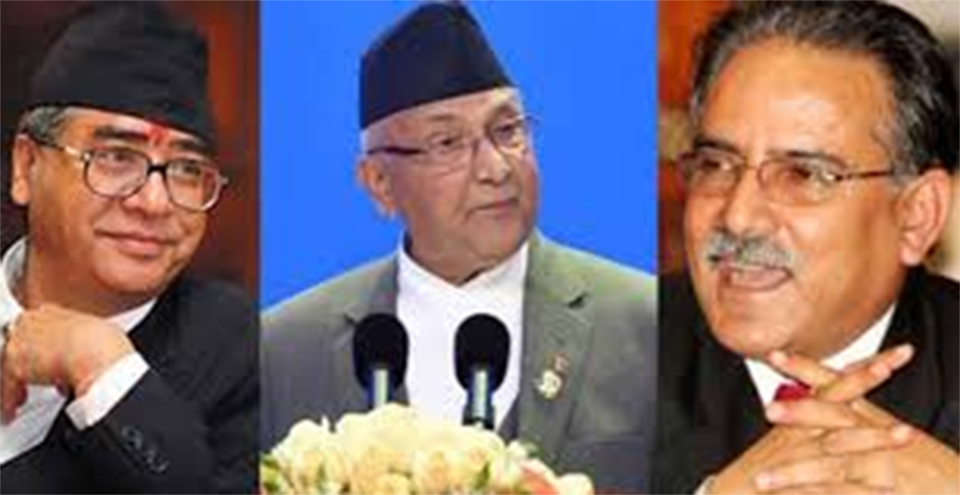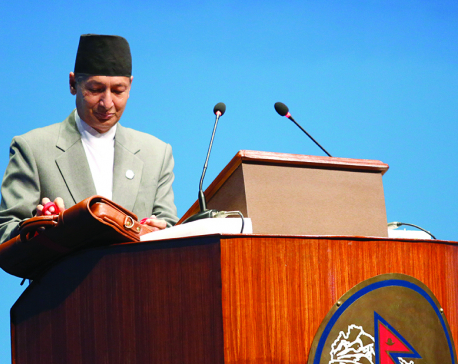
OR

Nepali people are tired of self-declared great storytellers of mainstream political parties and actors who are already past their prime
Many people cannot tell their own stories. That is why they need others to tell stories on their behalf. The storytellers play a crucial role in narrating the stories of people who suffer and experience. That is why narrators are expected to be omniscient narrators, not omnipresent characters. They must steer clear of exerting themselves into the story.
We listen to countless compelling stories from various storytellers on a daily basis. The competition intensifies with the realization that history records only the most dominant stories and narrators although political history records fringe stories and their narrators too.
We are living in the golden age of stories thanks to explosion of platforms and means of communications. We are woven into a larger scheme of stories in one way or the other whether we like or not. Stories come to us in different forms and shapes. Commercial producers weave short audio-visual stories to coax us into buying their products through use of make-believe artists, who may never use the products themselves.
Context is king. Some stories are so compelling that we simply believe in them despite their deceptive facade. I have myself bought various chewing gums to fight bad breathe far exceeding the price of a bottle of any mouthwash which lasts longer and effectively puts an end to my problem. I still regret buying certain sachets of shampoo to fight dandruff before realizing they were fighting against hair in my head.
How stories impact
Let’s examine how political leaders across continents tell stories to coax us into buying their ideologies and line of arguments. In America, most ambitious senators or governors or mayors or Congress (wo) men launch their version of story through books, which detail their struggles, achievements, beliefs and so on. That serves as a public pulse checker. A warmer reception of the book by their constituents and readers opens up many possibilities for them. There is no limit to what one can achieve through a successful storytelling skill in America.
Barack Obama had at least a couple of books to his credit before he came out unscathed from the mighty Hillary Clinton in the party’s presidential primaries in 2008 and fought against all odds to make history on the strength of his mature voice established though the books and his storytelling prowess. He is considered one of the greatest storytellers in America although he achieved way less than he could have done due to alleged obstruction of white arrogance (wall) that still bedevils America. He is also considered a great listener, which is a rare quality among politicians and storytellers.
It should be noted that Hillary penned What Happened only after losing to Donald Trump (with Art of the Deal to his credit) in the presidential election in 2016. She got vanquished by the most unlikely Republican opponent because she did not have her own voice (a book) although she had already been the First Lady, an influential Senator from the Empire State (New York), and the Secretary of State. History shows that most of the presidential hopefuls from the Republican and Democratic parties in the US have at least a book to their credit. It serves as evidence that the person has the capability to tell stories. Historically people tend to vote the best storytellers to the power in countries across the globe.
Politicians in developing countries who have not written books use their oratory skills to weave an appealing narrative to entice the public on their side. It’s their storytelling style that captures the public imagination. Narendra Modi, Prime Minister of India, has displayed similar knack of storytelling to spellbind a country of great storytellers to win a second term. He has Modified (derived from M-O-D-I, not modify) populism by customizing his narrative around the motifs of peoples’ ‘chowkidar’ (watchman /gatekeeper) and a humble ‘chai-wallah’ (tea-seller) to emerge as the most powerful person in the second most populous country in the world. He has sold his steely grit in the garb of humility.
Nepali storytellers
Our very own KP Sharma Oli is not a lesser storyteller. His proverbial offensives against his detractors have a profound impact on a swath of electorate that makes up the majority of active voters in Nepal. He deliberately created a narrative of nationalism during the Indian economic blockade to build an electoral alliance among the most traditional/conservative voting blocs including the Kathmanduites, who recently waged a war against him as ‘beiman jwain’ (dishonest son-in-law) for a proposed controversial Guthi Bill, which has now been withdrawn after massive protests.
When storytellers team up, they can easily manipulate characters in the stories. How the oppressor and oppressed storytellers gained from a single event is illustrated from the economic blockade of Nepal. Narendra Modi hardly received any rebukes from Indian intelligentsia for imposing an unwarranted economic blockade on a tiny neighboring country with a fragile economy. It had no impact on his ‘swachchha chhabi’ (clean image) as evidenced in his landslide electoral victory in the recent general elections. The very blockade turned out to be a boon for KP Oli in Nepal that catapulted him to power with two-thirds majority.
The Molism (fusion of Modism and Olism) has given birth to a new story of hybrid populism that is being told, heard and practiced currently across Nepal and India. South Asia has been holding the torch of populism aloft for the whole world to see although special versions of populism in America and England have stolen the limelight because of their partisan wrangling and Brexit fiasco respectively.
Populism is the order of the day does not mean it’s here to stay. Populism gains steam when the storytellers pretend to listen to people’s stories and commit to tell those stories before the powers that be as detached narrators. But they establish themselves as the main narrators cum characters soon. They confuse (or deliberately feign to) impression with impersonation. The very essence of the stories gets lost and the real characters get flagged and muted. Such manipulated stories sound very sensational at first but slowly lose their appeal among the public listeners. Donald Trump’s ‘drain the swamp’ won him the White House in America but he has himself been drowning in the swamp, according to his critics.
We have had heard enough of boring stories from major storytellers. Nepali Congress has always lacked any good storytellers after BP Koirala. It needs more storytellers like Gagan Thapa if it wants to keep itself afloat and relevant. Nepal Communist Party has an abundance of storytellers who keep telling pseudo-stories. They need more genuine storytellers like Gokarna Bista who can crystallize their words through actions.
The fact of the matter is that Nepali people are tired of self-declared great storytellers of mainstream political parties and actors who are already past their prime. They had better be aware that life is a bonus beyond fifty. Stories run the risk of veering toward senility despite sane efforts by septuagenarian storytellers.
Dreams galore if stories are heard from appropriate storytellers. It turns out to be a nightmare when inappropriate storytellers invade peoples’ imagination. Narratives frequently demand change in narration. Stories cannot be changed until the storytellers are changed.
The author loves to write on contemporary issues
baburamnyaupane1@gmail.com
You May Like This

Breaking the barriers
No matter how much we glorify role of ICT in improving education, it cannot happen without larger participation of teachers Read More...

Heritage in danger
Threats to cultural heritage of Kathmandu Valley can be overcome only with an optimum level of international cooperation, greater public... Read More...

Failing to impress
The well-known economist was expected to take drastic measures to rejuvenate the country’s economy but this has not happened under... Read More...







Just In
- NRB to provide collateral-free loans to foreign employment seekers
- NEB to publish Grade 12 results next week
- Body handover begins; Relatives remain dissatisfied with insurance, compensation amount
- NC defers its plan to join Koshi govt
- NRB to review microfinance loan interest rate
- 134 dead in floods and landslides since onset of monsoon this year
- Mahakali Irrigation Project sees only 22 percent physical progress in 18 years
- Singapore now holds world's most powerful passport; Nepal stays at 98th












Leave A Comment